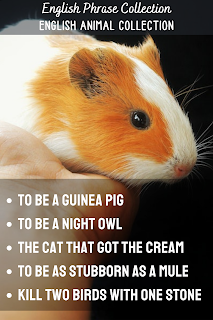Crushing It with Idioms: Mastering the Art of Animal-Inspired English Expressions
English idioms are a fascinating aspect of the language, adding colour and character to everyday conversations. Many of these expressions are inspired by animals, using the behaviour or characteristics of creatures to convey a particular meaning. In this blog post, we'll explore five popular English idioms featuring animals and their origins and usage.
To be a guinea pig
When we say someone is a "guinea pig," we mean that they are the first person to try out something new or untested. This expression likely comes from the use of guinea pigs in scientific experiments, where they were often the first animals to be tested on. Today, we use this idiom to describe someone who is a willing test subject or who is trying out something new.
To be a night owl
If someone is described as a "night owl," it means that they tend to stay up late and are most active during the night. This expression likely comes from the fact that owls are nocturnal creatures that are active at night. Today, we use this animal-inspired idiom to describe people who prefer to work or socialize at night.
The cat that got the cream
When someone has a smug or satisfied expression, we might say that they look "like the cat that got the cream." This idiom likely comes from the fact that cats enjoy cream as a treat, and they often have a contented expression after consuming it. Today, we use this animal-inspired idiom to describe someone who is extremely pleased with themselves or their situation.
To be as stubborn as a mule
If someone is described as being "as stubborn as a mule," it means that they are resistant to change or persuasion. This idiom likely comes from the fact that mules, which are a cross between a horse and a donkey, are known for their stubbornness and refusal to obey commands. Today, we use this animal-inspired expression to describe someone who is unyielding or obstinate.
Kill two birds with one stone
If someone manages to achieve two things at once, we might say that they "killed two birds with one stone." This idiom likely comes from the practice of hunting birds with stones, where a skilled hunter might be able to take down two birds with a single stone. Today, we use this animal-inspired idiom to describe a situation where someone is able to accomplish two tasks simultaneously.
In conclusion, animal inspired idioms add a touch of creativity and vividness to the English language. By exploring the origins and usage of these expressions, we can gain a deeper understanding of the way we use language to convey meaning.
If you want to learn more about idioms and language in general, be sure to check out our YouTube channel English Phrase Collection and our video on the topic.


No comments:
Post a Comment